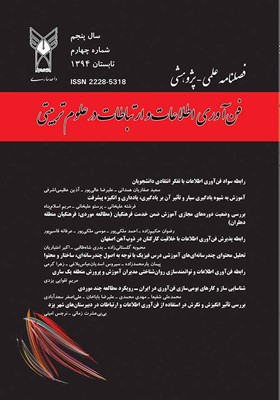رابطه سواد فنآوری اطلاعات با تفکر انتقادی دانشجویان
محورهای موضوعی :
آموزش عالی
سعید صفاریان همدانی
1
,
علیرضا عالی پور
2
*
,
آذین عظیمی اشرفی
3
1 - استادیار گروه مدیریت آموزشی، دانشگاه آزاد اسلامی واحد ساری، ساری، ایران
2 - دانشجوی دکتری مدیریت آموزشی، دانشگاه آزاد اسلامی واحد ساری و مدرس دانشگاه علوم دریایی، نوشهر، ایران
3 - دانشآموخته کارشناسی ارشد تکنولوژی آموزشی، دانشگاه آزاد اسلامی واحد ساری، ساری، ایران
تاریخ دریافت : 1393/05/27
تاریخ پذیرش : 1393/08/13
تاریخ انتشار : 1394/05/10
کلید واژه:
آموزش عالی,
تفکر انتقادی,
سواد فنآوری اطلاعات,
چکیده مقاله :
هدف اصلی پژوهش حاضر، بررسی رابطه سواد فنآوری اطلاعات با مهارتهای تفکر انتقادی دانشجویان تحصیلات تکمیلی میباشد. این پژوهش از لحاظ ماهیت توصیفی از نوع همبستگی است. جامعه آماری شامل دانشجویان تحصیلات تکمیلی دانشگاه آزاد اسلامی واحد ساری بود. از طریق جدول کرجسی و مورگان، تعداد 331 نفر از آنها به صورت تصادفی ساده، بهعنوان نمونه انتخاب شدند. ابزار پژوهش، پرسشنامه گرایش به تفکر انتقادی و پرسشنامه محققساخته سواد فنآوری اطلاعات است که روایی آنان از نظر متخصصان گروه علوم تربیتی بررسی و تأیید شد. پایایی پرسشنامهها از طریق ضریب آلفای کرونباخ در یک گروه 30 نفری، برای پرسشنامه سواد فنآوری اطلاعات 0/93 و برای پرسشنامه تفکر انتقادی 0/80 محاسبه گردید. با عنایت به اینکه مفروضه های آمار پارامتریک برقرار بود، جهت تجزیه و تحلیل داده ها از آزمون همبستگی پیرسون استفاده شد. نتایج حاصل از پژوهش نشان داد که بین سواد فنآوری اطلاعات با مهارت های تفکر انتقادی (خلاقیت، بالیدگی و تعهد) در بین دانشجویان تحصیلات تکمیلی رابطه ای وجود ندارد. لذا، نتایج نشاندهنده آن است که داشتن سواد فنآوری اطلاعات در بین دانشجویان تحصیلات تکمیلی، دلیلی بر وجود تفکر انتقادی در بین آنان نمی باشد. شاید بتوان، بهترین دوران پرورش تفکر افراد با استفاده از فنآوری اطلاعات را، دوران قبل از ورود آنان به آموزش عالی دانست.
چکیده انگلیسی:
The main objective of this study was to investigate the relationship between information technology literacy and critical thinking skills of graduate students. Adopting a descriptive survey, the statistical population of the study included graduate students of Islamic Azad University of Sari Branch. Using Krejcie and Morgan table, 331 were randomly selected. The research instruments were researcher-made information technology literacy questionnaire and critical thinking questionnaire, the validities of which were confirmed by the experts in the field of educational sciences. The reliabilities for the given questionnaires were estimated through Chronbach's alpha coefficient by distributing the questionnaires among a group of 30 participants, the result of which was 0.93 for IT literacy questionnaire and 0.80 for critical thinking skills. Regarding the establishment of parametric statistics, the Pearson correlation was used to analyze the data. The results of the study showed that there was no relationship between IT literacy and critical thinking skills (creativity, maturity and commitment) among higher education students. It means that IT literacy was not a reason for the existence of critical thinking, perhaps the best time for improving the thinking power among people through using information technology is before their entrance to higher education.
منابع و مأخذ:
Arkakli, R., Safari, N., & Hafezi, H. (2001). The effect of educational applications of ICT on critical thinking and attitude of junior high school students in district 4 of Tehran. Research on Curriculum, 8(3), 31. (in Persian).
Badri Gargari, R., Fathi Azar, E., Hosseininasab, S. D., & Moghadam, M. (2007). The critical thinking of students-teachers in Tabriz teachers education college. Psychology, 2(7), 1-24. (in Persian).
Brown, G. (1999). Information literacy curriculum and assessment, implications for schools from New Zealand. In Henri, J. and Bonano, K. (Eds), The Information Literate School Community, Best Practice. WaggaWagga: Centre for Information Studies.
Crumpacker, N. (2003). Faculty pedagogical approach, skill, and motivation in today’s distance education milieu. Retrieved from http://www.westga.edu/distance/ojdla/winter44/crumpacker44.html
Dejager, K., & Nassimbeni, M. (2002). Institutionalizing information literacy in tertiary education, lessons learnt from South African programmes. Library Trends, 51(2), 167-184.
Loveless, A. (2006). Developing conceptual frameworks for creativity, ICT and teacher education. Thinking Skills and Creativity,1(1), 3-13.
Mansoriyan, Y., & Naemabadi, M. (2004). The role of libraries website in promoting information literacy. Training for users and the development of information literacy in libraries, information centers and museums. Mashhad Seminar: User Education and Information Literacy in Libraries and Information Centers. (in Persian).
Mayerz, C. (1995). Training critical thinking (Tranlated by Abili, K.). Tehran: SAMT Publication. (in Persian).
Parirokh, M. (2007). Training of information literacy, concepts, methods and program. Tehran: Ketabdar Publications. (in Persian).
Pelgrum, W. J. (2001). Obstacles to the integration of ICT in education, results from a world - wide educational assessment. Computers & Education, 37(2), 163-178.
Pishghadam, R. (2008). Enhancing critical thinking with literary discussion in English classes. Language and Literature, 4(7), 153-167.
Radomski, N. (2000). Framing information literacy, the University of Ballarat Experience. In Bruce, C., Candy, P. (eds.), Information Literacy around the World: Advances in Programs and Research. Wagga Wagga, New South Wales: Charles Sturt University, pp 67-81.
Scriven, M., & Richard, P. (2004). Defining Critical Thinking. Retrieved from http://www.criticalthinking.org/aboutCT/definingCT.shtm
Seif, A. (2001). Educational psychology. Tehran: Aghah Publications. (in Persian).
Sringam, C., Barnes, A., & Yates, G. C. (2001). Investigating distance adult students learning outcomes through the integration of computer conferencing into distance education practices in Thailand. Paper presented at the Open and Distance Learning Association of Australia 15th Biennial Forum, Sydney, 24th-27th September. Retrieved from http://www.criticalthinking.org/university/ univlibrary/library.nclk
Tabatabayi, N. (1999). The survey of information literacy. Master's Thesis, Faculty of Education and Psychology, Tehran University. (in Persian).
Yu-Chu, Y. (2004). Nurturing reflective teaching during critical-thinking instruction in a computer simulation program. Computer & Education, 42(2), 181-194.
Zamani, E. (2003). Information literacy standards. Journal of Information, 19(1), 34-41. (in Persian).
Zangeneh, H. (2006). The impact of ICT on the development of critical thinking creative junior secondary school students in Tehran. Master's Thesis of Tabatabaei University. (in Persian).
Zurkowski, P. G. (1974). The information service environment relationships and priorities. Related Paper No. 5., National Commission on Libraries and Information Science, Washington, DC., National Program for Library and Information Services. Retrieved Nov 8, 2011, from http://eric.ed.gov/PDFS/ED100391.pdf

